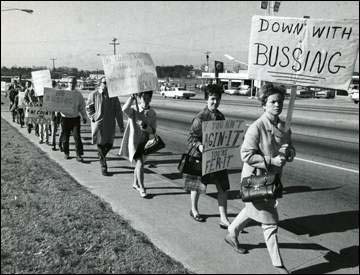Share This:
January 15, 2013 | Film,
The Many Stories of the Boston Busing/Desegregation Crisis
In 2009, Nigerian writer Chimamanda Adichie spoke at a TED Talks conference on The Danger of a Single Story. I was blown away by her idea. It was a simple one, so obvious, yet one that we do not give enough consideration. She suggests that:
“To focus on only one story is to flatten the experience and to overlook the many other stories.”
Similarly, quoted in a Huffington Post article regarding this year’s 150th anniversary of the signing of the Emancipation Proclamation, the director of the Smithsonian National Museum of African American History and Culture, Lonnie Burch, says that freedom was “a process, not a moment,” and only when we realize that can we “allow [ourselves] to wonder what work is left for us in the next ten years.”
It seems to me that we are too eager to simplify ideas and movements into a “single story.” Problem is, ideas and movements are much too complex to condense into something so compact.

The desegregation movement in the middle of the 20th century, for example, involves much more than is taught in schools today. Just as Lincoln did not abolish slavery with a stroke of his pen, Brown v. Board of Education did not immediately end segregation in public schools. Both were processes, and both involve many stories from many points of view. To ignore any of them would be to redefine history.
I distinctly remember learning about how Brown v. Board of Education sparked a wave of opposition in the South, but I learned very little about the movements in the North and West. Perhaps this was just a lapse in the quality of my own education in American History, but I feel that this issue warrants a more in-depth analysis in the classroom, since it is one that still affects us today.
After U.S. Federal Judge W. Arthur Garrity issued a court order in 1974 requiring Boston to implement desegregation busing, one of the stiffest resistance movements arose in our own backyard here in Boston. Riots, rallies and racist vigilante actions against nonwhite citizens erupted in Boston in the name of protecting the “vanishing rights” of whites. After Garrity ordered students from the mostly poor white South Boston High School be bused to the poor black Roxbury High School and vice versa, only 100 of the 1300 students at South Boston High showed up to school on the first day. Of the 500 South Boston students ordered to attend Roxbury High only 13 showed up. Parents were at the schools every day to protest, football season was cancelled, and whites and blacks began entering through different doors.
Elsewhere in Boston, the protests were more violent. One black attorney, Theodore Landsmark, was attacked in 1976 by white teenagers as he exited Boston City Hall. A reporter took a picture of the scene, titled “The Soiling of Old Glory,” winning him a Pulitzer Prize.
The Union of Minority Neighborhoods understands the necessity of broadcasting all of these stories to help us gain a holistic understanding of the desegregation/busing crisis in Boston. Their goal is to use these stories from diverse communities to help direct public schools toward “quality education, community engagement and action, racial and class equality, and cultural and historical literacy.” One of the tools they use to do this is the documentary Can We Talk?, which explores the Boston busing/desegregation crisis through the lens of several interviewees. This documentary breaks down notions of a “single story” – it amplifies marginalized voices to help us better understand our own history and move forward into a new era of growth and equality.
When we learn about our history, we learn about ourselves and our neighbors. It’s a disservice to ourselves and our community if we accept only a single story to define a movement of various dimensions that affected so many. And what better way to learn of such things than a documentary?
Can We Talk? will be presented in the Bright Family Screening Room at the Paramount Center on Saturday, January 19th at 5pm. There will be a talkback following the film with Donna Bivens, Project Director of the Boston Busing/Desegregation Project and Meghan Doran, Project Organizer of the Boston Busing/Desegregation Project.




Leave a Reply